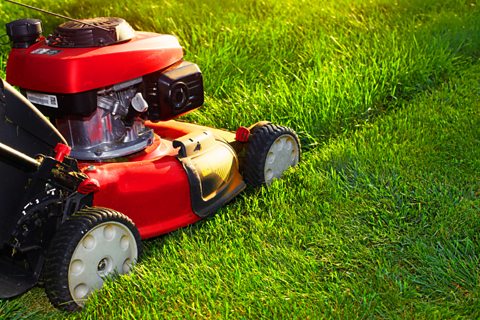Work experience
Current work experience
In an interview, you may have to explain what work experience - Arbeitserfahrung - you have.
Question
Match these sentences with the English. Then check your answers.
| German | English |
| 1. Ich kopiere. | A. I do the washing up. |
| 2. Ich mache die Betten. | B. I clean and tidy up. |
| 3. Ich repariere Elektrogeräte. | C. I answer phone calls. |
| 4. Ich wasche Autos. | D. I do the photocopying. |
| 5. Ich mähe den Rasen. | E. I repair electrical appliances. |
| 6. Ich putze und räume auf. | F. I help in the kitchen. |
| 7. Ich helfe den Kunden. | G. I wash cars. |
| 8. Ich beantworte Anrufe. | H. I mow the lawn. |
| 9. Ich helfe in der Küche. | I. I make the beds. |
| 10. Ich wasche ab. | J. I help the customers. |
| German | 1. Ich kopiere. |
|---|---|
| English | A. I do the washing up. |
| German | 2. Ich mache die Betten. |
|---|---|
| English | B. I clean and tidy up. |
| German | 3. Ich repariere Elektrogeräte. |
|---|---|
| English | C. I answer phone calls. |
| German | 4. Ich wasche Autos. |
|---|---|
| English | D. I do the photocopying. |
| German | 5. Ich mähe den Rasen. |
|---|---|
| English | E. I repair electrical appliances. |
| German | 6. Ich putze und räume auf. |
|---|---|
| English | F. I help in the kitchen. |
| German | 7. Ich helfe den Kunden. |
|---|---|
| English | G. I wash cars. |
| German | 8. Ich beantworte Anrufe. |
|---|---|
| English | H. I mow the lawn. |
| German | 9. Ich helfe in der Küche. |
|---|---|
| English | I. I make the beds. |
| German | 10. Ich wasche ab. |
|---|---|
| English | J. I help the customers. |
- 1. Ich kopiere. – D. I do the photocopying.
- 2. Ich mache die Betten. – I. I make the beds.
- 3. Ich repariere Elektrogeräte. – E. I repair electrical appliances.
- 4. Ich wasche Autos. – G. I wash cars.
- 5. Ich mähe den Rasen. – H. I mow the lawn.
- 6. Ich putze und räume auf. – B. I clean and tidy up.
- 7. Ich helfe den Kunden. – J. I help the customers.
- 8. Ich beantworte Anrufe. – C. I answer phone calls.
- 9. Ich helfe in der Küche. – F. I help in the kitchen.
- 10. Ich wasche ab. – A. I do the washing up.
Previous work experience
To say what you have already done at work, you need to use verbs in the perfect tense.
To form the perfect tense you need:
- the correct part of the auxiliary verbs haben (to have) or sein (to be)
- a past participle
Past participles - weak verbs
machen (to do) and putzen (to clean) are weak verbs, so their past participles are gemacht and geputzt.
- ich habe... gemacht – I did
- ich habe... geputzt – I cleaned
aufräumen (to tidy up) is weak, but also separable. This is how you form the perfect tense with weak, separable verbs:
- Take off auf-
- Make -räumen into a past participle > geräumt
- Put auf- back in front of it > aufgeräumt
Example in use
ich habe aufgeräumt – I tidied up
reparieren (to repair) and kopieren (to photocopy) are weak, but have no ge- at the start of the past participle. Similarly, the past participle of beantworten (to answer) is beantwortet. Look at the following examples:
- ich habe...repariert – I repaired
- ich habe...kopiert – I photocopied
- ich habe...beantwortet – I answered
Past participles - strong verbs
helfen, waschen and anrufen are strong verbs. Their past participles are all different and end in -en.
- ich habe... geholfen – I helped
- ich habe... angerufen – I called, telephoned
- ich habe... gewaschen – I washed
Question
Are these sentences in the present or perfect tense?
Translate them and then check your answers.
- Ich helfe den Kunden.
- Ich habe aufgeräumt.
- Ich repariere Elektrogeräte.
- Ich wasche ab.
- Ich habe früher Autos gewaschen, aber ich repariere jetzt Motoren.
- I help the customers. (present tense)
- I tidied up. (perfect tense)
- I repair electrical appliances. (present tense)
- I do the washing up. (present tense)
- I used to wash cars (perfect tense), but now I repair engines (present tense)
Examples in use
Listen to people talking about what they do, or have done, at work.

Question
Ich habe früher als Kassiererin gearbeitet, aber ich bin jetzt Sekretärin.
Ich arbeite im Garten und mähe den Rasen.
Ich habe früher als Verkäuferin gearbeitet. Ich habe den Kunden geholfen, aber jetzt bin ich Managerin.
Ich beantworte Anrufe und kopiere auch.
Ich arbeite in einer Garage und repariere Autos.
- I used to work at the checkout, but now I am a secretary.
- I work in the garden and mow the lawn.
- I used to work as a shop assistant. I helped the customers, but now I’m a manager.
- I answer telephone calls and do the photocopying.
- I work in a garage and repair cars.